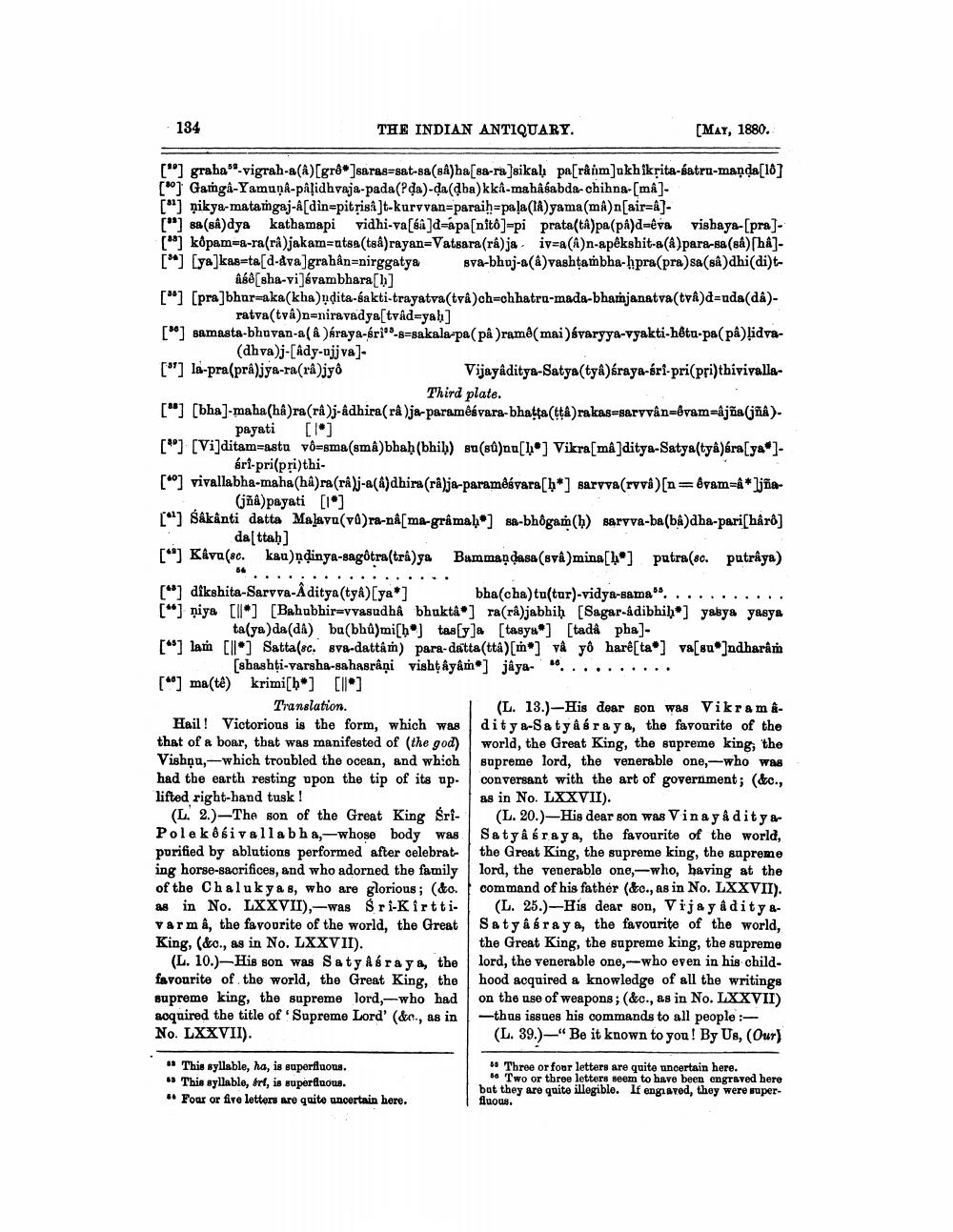________________
134
THE INDIAN ANTIQUARY.
[] graha-vigrah-a(a) [grê*]saras-sat-sa (sa) ha[sa-rasikal pa[râim]ukhikrita-satru-manda[18] [] Gamga-Yamuna-pâlidhvaja-pada (?da)-da (dha) kka-mahâsabda-chihna-[mâ][] nikya-matamgaj-â[din-pitrisâ]t-kurvvan-paraih-pala (l)yama (mâ)n[air=â]["sa(s)dya kathamapi vidhi-va[i]d-apa[nt]-pi prata(t)pa(pi)d-iva vishaya-[pra][*] kôpam-a-ra(ra)jakam-utsa (tså) rayan-Vatsara (ra) ja iv-a (A)n-apêkshit-a(a)para-sa (sa) [hâ][*] [y]ka-in[d-Ava]grahin=nirggatys sva-bhuj-a(4)vaabtambha-hpra(pra)ca(så)dhi(di)t46aha-vivambhars[b]
["] [pra]bhur aka (kha)udita-sakti-trayatva (tvâ)ch=chhatru-mada-bhaṁjanatva(tvâ)d=uda(dâ)ratva(tv)niravadya[tvid-yab]
[*] samasta-bhuvan-a( a )sraya-sri-s-sakala-pa ( pâ )ramê(mai)śvaryya-vyakti-hêtu-pa(pâ)lidva(dhra)j-[kdy-ujjva]
["]la-pra(priya-rari)jy
Vijayaditya-Satya(ty)éraya-érl-pri(pri)thivivalla
[MAY, 1880.
Third plate.
[*] [bha]-maha (ha)ra (râ)j-âdhira (râ )ja-paramêsvara-bhatta (ttâ)rakas=sarvvân=êvam=âjña(jñâ)payati [1]
["] [Vi]ditamasta vd-sma(små)bhab(bhil) (si)nn[b] Vikra[m]ditya-Satya(tyà)ára[ya*]
árt-pri(pri)thi
[]vivallabha-maha(h)ra(ri)j-a(4)dhira (rk)ja-parambévara[b] sarvva(rvvé)[nam-j
(a)payati [1]
[] Sâkânti datta Malava(va)ra-nâ[ma-grâmah] sa-bhogam(h) sarvva-ba (ba)dha-pari[hârô] da[tab]
[] Kiva(
Bammapasa (ev)mina[b] putra(e. patriya)
bha(cha) tu(tur)-vidya-sama"".
[] dikshita-Sarvva-Aditya(ty) [y] [] niya [] [Bahubhir-vvasudha bhuktâ] ra(ra)jabhih [Sagar-âdibhih] yasya yasya talya)da(d) babhi)mi[b] [y] [tasys] [tad [] lam [*] Satta(sc. sva-dattâm) para-datta (tta) [m] va yô harê [ta*] va[su*]ndharâm [ahaahti-varsha-sahnerigi vishayk jya" [] ma(tê) krimi[b*] [*]
pha]
56
kan)adinys-engůtra(tri)ya
Translation.
Hail! Victorious is the form, which was that of a boar, that was manifested of (the god) Vishnu,-which troubled the ocean, and which had the earth resting upon the tip of its uplifted right-hand tusk !
(L. 2.) The son of the Great King SriPoleksivallabha,-whose body was purified by ablutions performed after celebrating horse-sacrifices, and who adorned the family of the Chalukyas, who are glorious; (&c. as in No. LXXVII),-was Sri-Kirttivarmâ, the favourite of the world, the Great King, (&c., as in No. LXXVII).
(L. 10.)-His son was Satyasraya, the favourite of the world, the Great King, the supreme king, the supreme lord,-who had acquired the title of 'Supreme Lord' (&c., as in No. LXXVII).
This syllable, ha, is superfluous.
This syllable, ért, is superfluous.
Four or five letters are quite uncertain here.
(L. 13.)-His dear son was Vikramâditya-Satyasraya, the favourite of the world, the Great King, the supreme king, the supreme lord, the venerable one,-who was conversant with the art of government; (&c., as in No. LXXVII).
(L. 20.)-His dear son was VinayadityaSatyasraya, the favourite of the world, the Great King, the supreme king, the supreme lord, the venerable one,-who, having at the command of his father (&c., as in No. LXXVII).
(L. 25.)-His dear son, Vijay âdityaSatyâśraya, the favourite of the world, the Great King, the supreme king, the supreme lord, the venerable one,-who even in his childhood acquired a knowledge of all the writings on the use of weapons; (&c., as in No. LXXVII) -thus issues his commands to all people:
(L. 39.) "Be it known to you! By Us, (Our)
ss Three or four letters are quite uncertain here.
56 Two or three letters seem to have been engraved here bat they are quite illegible. If engraved, they were superfluous.




